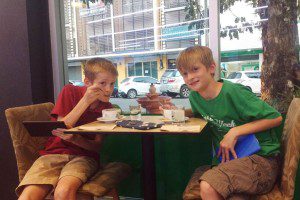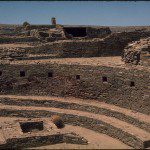It’s good to be back at the Anxious Bench after a spring semester hiatus. As guests published a series of terrific posts in my place, I read them from Thailand, where my family and I spent over two months. We drove on the other side of the road, bathed elephants in mud pits, watched minor-league Thai soccer, canoed to an island in the Gulf of Thailand, ate fried bugs on the streets of Bangkok, and went to some amazingly low-cost dentists.
I also worked hard. The scholarly reason for the trip was to collect data for the final chapter in my current project on global religion. Specifically, the book will look at how global encounters shape American evangelical views and practices regarding race, missions, humanitarian work, supernaturalism, sexuality, and immigration. I intend to use the American antitrafficking movement in Southeast Asia as a case study into how methods of social justice have changed in the last several decades.

Over the next months and years, I’ll be writing extensively about the fascinating stories I gathered. But the process of gathering data was interesting in its own right. As much as I enjoy flipping through old documents with dainty white gloves that don’t fit, doing research in new settings was a lot of fun. My research took me to churches and bars, hole-in-the-wall NGO offices, and the Southeast Asia headquarters of the United Nations. But most of my oral history interviews—about 30 with Thai informants and about 60 with Western informants—took place in coffee shops in Bangkok and Chiang Mai. (Coffee culture in Thailand is young. Very few of the hundreds of coffee shops in Chiang Mai were around ten years ago, and I had been warned about instant Nescafé posing as the real thing. But I enjoyed many excellent lattes. It may be hard to return to the austerity of the archives.)
These new sites of research brought new kinds of sources. After historical training that taught me to “interrogate” written sources, it was delightful to ask questions of living, breathing sources who talked back. My informants often filled in gaps that documents could not, and I enjoyed seeing personality and passion in faces with the kind of depth that sometimes eludes written expression.
But I also discovered that live human subjects have their own set of limits, an insight that is nothing new for sociologists or journalists. The ravages of time sometimes produce poor memory. A dishonest researcher can lead sources. A clumsy researcher can shut down sources. A cowboy researcher can actually harm sources. To be sure, historians can do violence to non-living people, but Institutional Review Boards seem to care less about that.
In Thailand, the delicate dance between researcher and informant had much to do with the cultural demands of deference and hospitality. On one hand, my sources felt a cultural obligation to host this farang scholar. That I was a professor, imbued in their minds with a certain rank and authority, heightened their sense of obligation.
On the other hand, deference also limited what many were willing to say. I came to Southeast Asia interested in Thai evaluations of Western humanitarian interventions. But many, unwilling initially to offer critiques, only expressed gratefulness to the good-hearted, passionate Americans who cared so much about justice. I learned to restructure my interviews. Instead of leading with questions about Western liabilities, I began to leave more space for affirmations before asking for critiques. It worked. My interview data began to take very different—and much more interesting—shape.
Postmodern insights regarding narrative and power were on full display. To be sure, they are evident in the archives too. But seeing them play out in flesh and blood in real time gave me a fuller sense of the limits of historical knowledge.













